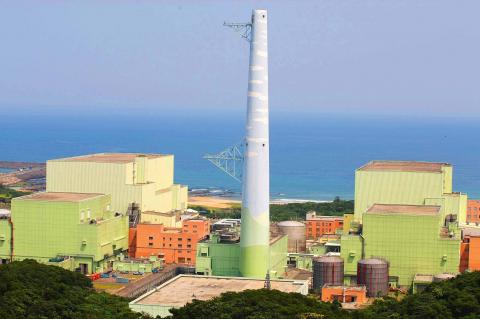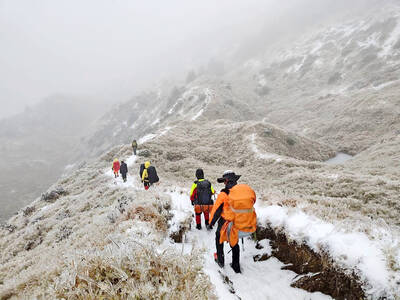Taipei Mayor Hau Lung-bin (郝龍斌) yesterday stood firm on his opposition to the continued construction of the Fourth Nuclear Power Plant, amid concern from the Presidential Office and the Chinese Nationalist Party (KMT) about his stance on the issue.
Hau became the first local government head from the pan-blue camp to declare his stance on the nuclear issue by saying on Thursday that he would vote “yes” in a national referendum asking voters if construction and operation of the plant should be suspended.
His announcement prompted President Ma Ying-jeou (馬英九) to call him on Thursday night to discuss his stance on the power plant. Ma met him yesterday in the Presidential Office to continue their discussion on the issue.

Photo: CNA
Presidential Office spokesperson Lee Chia-fei (李佳霏) said Ma and Hau exchanged opinions on the construction of the power plant, alternative sources of energy and the potential impact on the economy if the plant is suspended.
“The president said whether or not the Fourth Nuclear Power Plant should be suspended is a crucial issue, and the public must be given sufficient information to help them make the final decision,” she said.
Hau yesterday said he opposed the construction of the power plant because of the state-owned Taiwan Power Co’s (Taipower) poor quality control over the plant and its failure to solve the problem of storing nuclear waste.
“I told President Ma that under the current situation, I would support suspension of the Fourth Nuclear Power Plant if the referendum is held tomorrow. My stance will not change,” he said.
As the government prepares for a national referendum on the issue, Hau said he believed the public would gain a better understanding of the power plant’s operations and its safety issues, and that a public consensus could be formed gradually.
“If more and more people oppose the plant’s construction, or local city councilors voted to oppose its construction, the government can reconsider the necessity of holding a referendum,” he said.
At a question-and-answer session at the legislature yesterday, Premier Jiang Yi-huah (江宜樺) said that he, the president, New Taipei City Mayor Eric Chu (朱立倫) and Hau were in frequent contact with each other to exchange views about the power plant.
“We all share the same position,” Jiang said when answering questions from KMT Legislator Hsu Shao-ping (徐少萍).
Hau’s statement that he would vote for halting construction was predicated on the “referendum being held tomorrow,” Jiang said.
“We understand that people are concerned about the nuclear power plant’s safety, which is why the government is set to invite internationally recognized experts to conduct a comprehensive safety assessment of the power plant,” Jiang said.
Once the safety assessment is completed and related information on nuclear safety is made public, people will be more well-informed before the referendum, he said.
Separately yesterday, KMT Secretary-General Tseng Yung-chuan (曾永權) led about 30 members to visit the plant in New Taipei City’s (新北市) Gongliao District (貢寮).
KMT spokesman Yin Wei (殷瑋) said party members visited the plant’s pumping station and control room and asked Taipower to ensure transparency in disclosing public information about the plant.
The KMT’s nuclear policy remains the same, which is to ensure nuclear safety and to reduce the nation’s dependence on nuclear power gradually, he added.
Additional reporting by Shih Hsiu-chuan

Trips for more than 100,000 international and domestic air travelers could be disrupted as China launches a military exercise around Taiwan today, Taiwan’s Civil Aviation Administration (CAA) said yesterday. The exercise could affect nearly 900 flights scheduled to enter the Taipei Flight Information Region (FIR) during the exercise window, it added. A notice issued by the Chinese Civil Aviation Administration showed there would be seven temporary zones around the Taiwan Strait which would be used for live-fire exercises, lasting from 8am to 6pm today. All aircraft are prohibited from entering during exercise, it says. Taipei FIR has 14 international air routes and

The Ministry of National Defense (MND) today released images of the military tracking China’s People's Liberation Army (PLA) movements during the latest round of Chinese drills around Taiwan. The PLA began "Justice Mission 2025" drills today, carrying out live-fire drills, simulated strikes on land and maritime targets, and exercises to blockade the nation's main ports. The exercises are to continue tomorrow, with the PLA announcing sea and air space restrictions for five zones around Taiwan for 10 hours starting from 8:30am. The ministry today released images showing a Chinese J-16 fighter jet tracked by a F-16V Block 20 jet and the

Snow fell on Yushan (Jade Mountain, 玉山) yesterday morning as a continental cold air mass sent temperatures below freezing on Taiwan’s tallest peak, the Central Weather Administration (CWA) said. Snowflakes were seen on Yushan’s north peak from 6:28am to 6:38am, but they did not fully cover the ground and no accumulation was recorded, the CWA said. As of 7:42am, the lowest temperature recorded across Taiwan was minus-5.5°C at Yushan’s Fengkou observatory and minus-4.7°C at the Yushan observatory, CWA data showed. On Hehuanshan (合歡山) in Nantou County, a low of 1.3°C was recorded at 6:39pm, when ice pellets fell at Songsyue Lodge (松雪樓), a

NO SHAME IN RETREAT: Hikers should consider turning back if the weather turns bad or if they do not have sufficient equipment, the Taroko park headquarters said Two people died of hypothermia over the weekend while hiking on Hsuehshan (雪山), prompting park authorities to remind hikers to bring proper equipment and consider their physical condition before setting out in the cold weather. Temperatures dropped over the weekend, bringing snow to high altitudes in Shei-pa National Park. One hiker, surnamed Lin (林), who on Friday was traveling with a group of six along the Hsuehshan west ridge trail, lost consciousness due to hypothermia and died, the Shei-pa National Park Headquarters said. On Saturday, another hiker, surnamed Tien (田), in a group of five on the southeast of the west